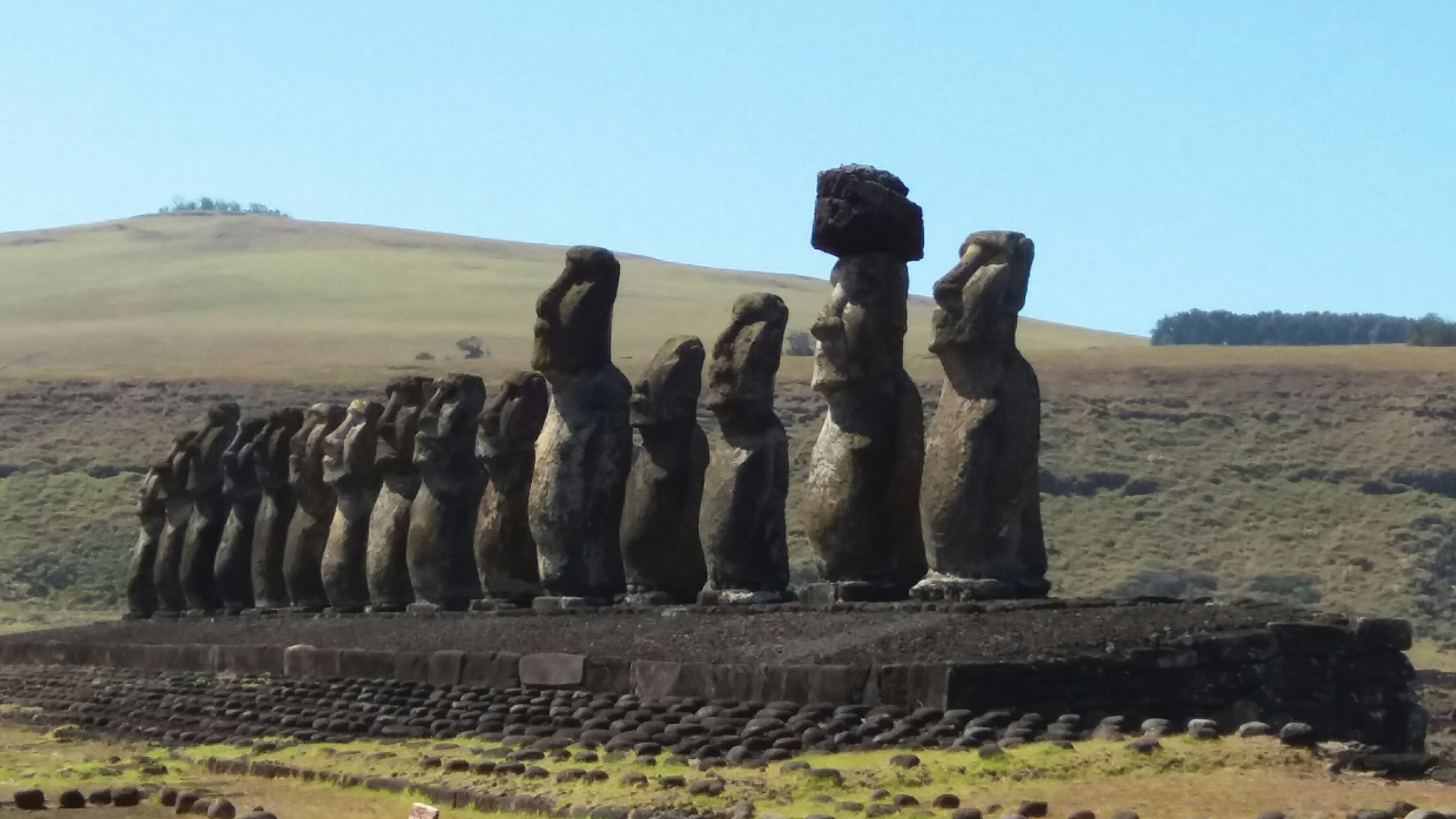
Easter Island, (Isla de Pascua or Rapa Nui), is located 2,340 miles NW of Santiago, Chile (5 hours on the plane). This diminutive volcanic island is an unsolved mystery. Speculation abounds as to why and who the people were, and why they carved the Moai. What did it all mean?
Some history:
Best guess is that Polynesians landed on the island around 1000 AD. The island was lush with vegetation and trees. Humans have a way of changing the landscape. Their ravaging of the land was their downfall. When they arrive, they began carving statues (called Moai)

Tongariki, 15 Moai on an Ahus (stone platform). A Japanese company sponsored the reassembly of this site.
from the volcanic tuff – volcanic ash + lava (name of volcano-Rano Raraku). The early Moai had human characteristics: they were kneeling, had rounded head, complete torso. As time passed, the Moai took a more stylized appearance: no legs, elongated head with sharp features, long ear-lobes, arms – no hands, eye sockets.
The people of Rapa Nui began cutting down the trees to use the timber to make a sled to transport the Moai to different locations on the island. Gradually, they turned the island into a barren rock. Food became scarce. Water has always been a problem on the island. The tribes began to fight each other. Since the Moai represent power and energy, a warring tribe would attempt to topple another tribes Moai. A broken Moai has no energy.
Civil war was only one of the Rapa Nui’s problems. In 1862, Peru slave pirates raided the island for the young and strong, taking them back to work the guano deposits. Soon there were few residents left. Shortly after,

Statue of “Birdman” in the Iglesia Sagrado Corazon. Shows the combining of Christian and Island symbolism.
French missionaries came to convert those who remained, to Christianity.
Today, Chile governs Easter Island. The cultures are 180 apart and no love loss between the two.
Being a tourist on Easter Island:
1. How to do I get there? You can fly from Santiago or Tahiti via LAN airlines.
LAN operates one flight in and out/day, more flights during the big holiday in February.
2. Where do I stay? No Hilton or Holiday Inn. There are adequate accommodations. Hare Noi is probably the most expensive hotel on the island. We stayed at Cabana Mataveri, a 15 min. walk from town. Clean, WiFi, breakfast and a friendly staff.
3. Where do I eat? Good food, a little pricey since so much has to be imported, everywhere.
My two favorites were Te Moana and Club Sandwich. Rule of Thumb, the seafood is fresh and good. At Club Sandwich only order one sandwich. They are huge. Too much for one person.
4. How do I get around? Depending on your budget, rent-a-car, bicycle, ATV, or walk. Oceanic is the best place. If you rent a bike, remember the island is hilly. Town and close by works best for biking.
Don’t be stupid like us. We decided to bike the length of the island to the northern volcano. It’s not so much the distance as the constant wind against you and those damn hills. About 1/2 way, we decided this was no fun and went back to town.
Taxis: a great way to get from place to place. Typically 2,000 Chilean pesos no matter where you are going. Lots of them on the island so they are easy to flag down.
4. What to do? Begin with a tour. We used Aku Aku. Christina was our guide and did  an excellent job. She leads a combination of Spanish and English speaking tourists. She presents the information in both languages. Once you have a feel for the island, pick things that interest you. Here are some ideas:
an excellent job. She leads a combination of Spanish and English speaking tourists. She presents the information in both languages. Once you have a feel for the island, pick things that interest you. Here are some ideas:
Varua Ora: traditional dance show. Lots of fun and the dancers never stop trying to
entertain you.
Snorkeling and visiting the caves
Kayaking
Museums and Botanical Gardens
Shopping – the island is filled with small shops that sell the usual knick
-knacks. There are very few middle tier shops that offer quality souvenirs. There are high-end shops with artist level carvings and paintings.
5. What money is accepted? Chilean pesos, some places will take US$. Most places will NOT accept credit cards. There are two banks on the island with ATM’s.
Our trip, including air travel, was five days. I had a great time, but by Day Five, I was ready to get back to Santiago. We didn’t do everything; however, John and I tried to pack as much into each day as possible. In retrospect, I would double the time and slow down the action. By boarding time, my lips were sunburned, my body felt like a new location for salt deposits…a case of over-doing it.
Seeing your first one-hundred Moai is a thrill. After that, it’s “geez, here’s another one.” I asked Christina, our Aku Aku guide, her honest feeling about the Moai. She explained that because of her ancestors carving these gigantic statues, she has a job. She was correct when she said that I wouldn’t have come to the island if there were no Moai. Yes, they take center stage. But the island offers so many supporting roles.
If you’re looking for a different trip, this is it. Even the Galapagos is crowed and touristy compared to Rapa Nui.













